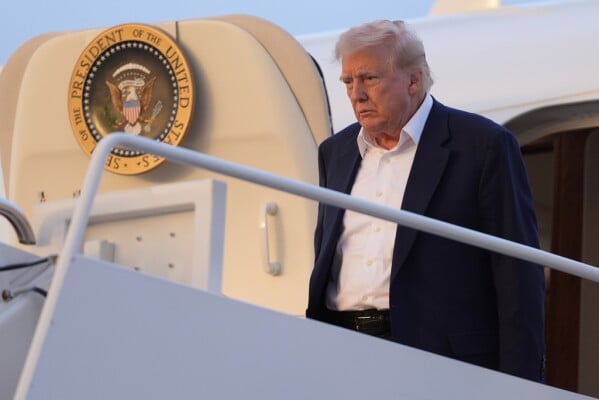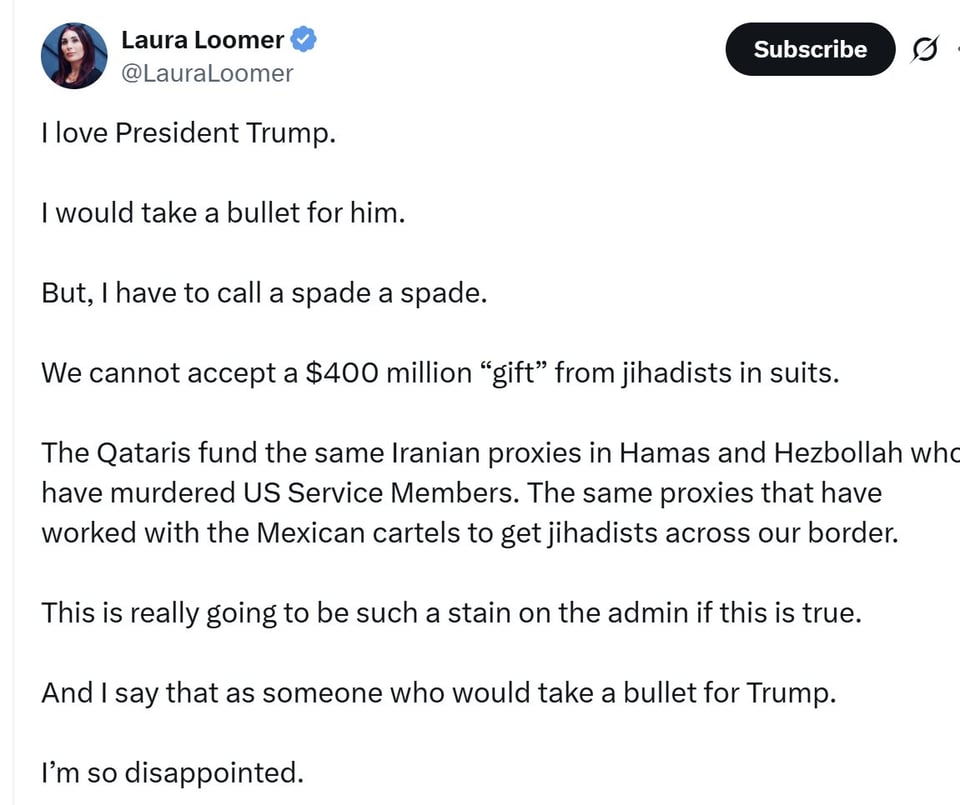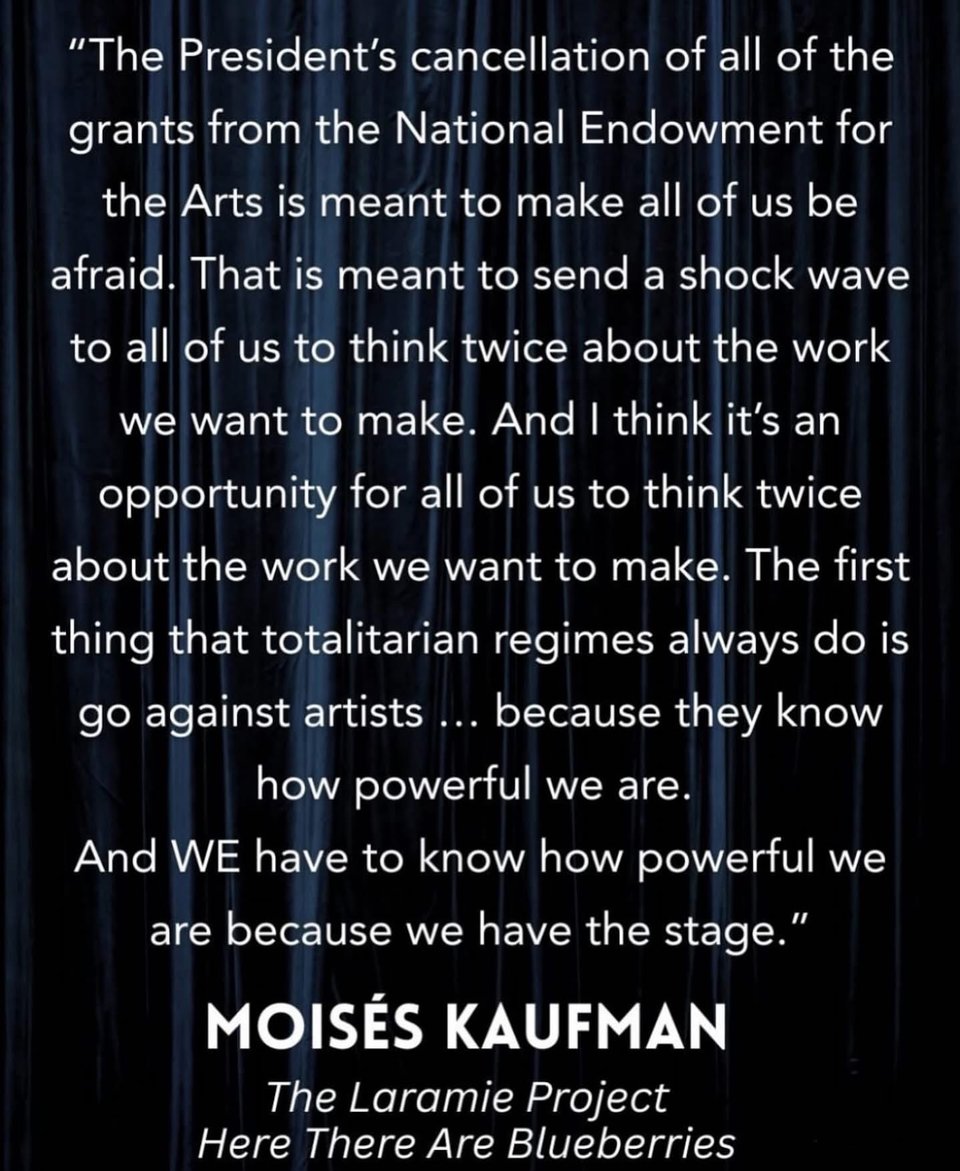Tuesday, May 13, 2025. Annette’s Roundup for Democracy.
The Roundup challenge.
Read the Constitution this week, even if you think you know it well. Get one other person to read it too.
Buy a copy, bundled with Declaration of Independence for $5.99 on Amazon.
A Warning From Justice Souter: Democracy Is in Peril
Justice David H. Souter, who died last week, said in 2012 that public ignorance of the Constitution could lead to the rise of an autocrat and the death of democracy.

Justice David H. Souter, who died last week at age 85, made few public appearances after he retired from the Supreme Court in 2009. When he did, he stayed away from politics.
But a seemingly bland question from an audience member at a New Hampshire arts center in 2012 provoked an impassioned response from the justice, who was the opposite of excitable.
He said he was worried that public ignorance about how American government works would allow an authoritarian leader to emerge and claim total power. “That is the way democracy dies,” he said.
“An ignorant people can never remain a free people,” the justice said. “Democracy cannot survive too much ignorance.”
Not understanding how power is allocated among the three branches of government, he said, leaves a void that invites a strongman. After a crisis, he said, “one person will come forward and say, ‘Give me total power, and I will solve this problem.’”
That was four years before Donald J. Trump, as he accepted the Republican presidential nomination for the first time, said something strikingly similar: “Nobody knows the system better than me, which is why I alone can fix it.”
There is no reason to think Justice Souter had Mr. Trump in mind when he spoke. Among the things the justice did not pay attention to were New York real estate and reality television.
In his remarks in 2012, during an hourlong interview with Margaret Warner of “PBS NewsHour” before over 1,300 people in Concord, N.H., Justice Souter was in an amiable mood, but he gave guarded answers. He did not enjoy public attention, once telling a colleague that “in a perfect world, I would never give another speech, address, talk, lecture or whatever as long as I live.”
He made an exception for Ms. Warner, who had covered him for The Concord Monitor when he became New Hampshire’s attorney general in 1976. But there was little reason to think he would say anything of note.
Then a woman from Windham, N.H., lobbed a gentle softball of a question: What should schools be doing to produce civically engaged students?
Justice Souter grew animated. He warned the audience that he might be talking for a while, and he later thought to make clear that the question had not been planted.
“I’ll start with the bottom line,” he said. “I don’t believe there is any problem of American politics and American public life which is more significant today than the pervasive civic ignorance of the Constitution of the United States and the structure of government.”
He remembered his high school days, in Concord. “There were two required civics courses,” he said. “When we got out of high school, we may not have known a lot, but we at least had a basic understanding of the structure of American government.”
Justice Souter, a Rhodes scholar with a deep knowledge of history, sensed a parallel.
“That is how the Roman Republic fell,” he said, with Augustus becoming an autocratic emperor by promising to restore old values.
The rise of such a strongman was hastened, Justice Souter said, by public ignorance. Americans’ lack of knowledge means, he said, that “the day will come when somebody will come forward, and we, and the government will, in effect, say: ‘Take the ball and run with it. Do what you have to do.’”
In the rest of the conversation, Justice Souter gave cautious answers to questions about what were then recent Supreme Court decisions.
A student asked how he would have voted in a challenge to the Affordable Care Act, President Barack Obama’s health care law. “Going to take a pass on that one,” Justice Souter said.
Ms. Warner asked about the Citizens United campaign finance case, which was decided a few months after he left the court. “I’m going to take a partial pass on that,” he said, because “you can’t get into that subject and explore it fully without getting into politics.” He may have also been reluctant to discuss the case because, as Jeffrey Toobin reported in The New Yorker, he had written a scathing draft dissent that caused the case to be argued a second time.
Justice Souter did say that he was “certainly unrepentant” about joining a dissent from the court’s 2008 decision recognizing an individual right to own guns.
As the event neared its end, Ms. Warner asked Justice Souter to say more about the threat to democracy.
“I don’t think we have lost it,” the justice said. “I think it is in jeopardy. I am not a pessimist, but I am not an optimist about the future of American democracy.”
“We’re still in the game,” he added, “but we have serious work to do, and serious work is being neglected.” (New York Times).
Qatari plane for Trump hits the emolument nerve.
Trump, Pressed on Qatari Jet, Says Only ‘Stupid’ People Reject Gifts.

The president grew angry when questioned about the ethical implications of accepting a luxury jetliner from a foreign government.
President Trump angrily brushed off ethical concerns about accepting a $400 million luxury jet from Qatar to be used as a new Air Force One, saying only someone “stupid” would turn down such an offer.
“I think it’s a great gesture from Qatar. I appreciate it very much,” Mr. Trump said. “I would never be one to turn down that kind of an offer. I mean, I could be a stupid person say, ‘No, we don’t want a free, very expensive airplane.’ But it was — I thought it was a great gesture.”
Qatari officials say the plan for Mr. Trump to accept the plane for use as Air Force One while he’s in office is not finalized. Some senior U.S. officials, however, have openly described it as an eventuality, one signed off on by the White House counsel and the attorney general, Pam Bondi. Mr. Trump has repeatedly complained of delays and cost overruns in a contract with Boeing for two new presidential jets.
He grew angry at the questions of an ethical quagmire, including whether Qatar expected anything in exchange for the donation, which he said would be to the Defense Department and not to him personally. Democrats and government watchdogs have suggested the donation would violate the emoluments clause of the Constitution, and create an incentive structure for Mr. Trump regarding Qatar.
“You should be embarrassed asking that question,” Mr. Trump told an ABC News reporter who pressed him on the issue. “They’re giving us a free jet. I could say, ‘No, no, no, don’t give us. I want to pay you a billion or $400 million, or whatever it is.’ Or I could say, ‘Thank you very much.’”
He then invoked a golf analogy about accepting a free putt during a round, suggesting that following rules when one doesn’t have to is foolish.
But on Monday Mr. Trump said when the Qatari plane is decommissioned from military use and is turned over to his library at the end of his term that he won’t continue flying in it.
One more thing. Or two. Or three. Or four. Or five.
When even Laura Loomer says ouch!

Bill Kristol. A Golden 747 from Hamas’ Sugar Daddy.
Trump can't abide flying around in crusty, old Air Force One. Qatar—funder of both Hamas and the leading U.S. college Gaza protest group—just happens to have a spare, pimped-out 747 lying around, which they'd like to gift to Trump so he can use that instead. Pay no attention to the complete hypocrisy of an administration that says that students protesting for Gaza are a threat to our foreign policy. (The Bulwark)
The headline 👇 says it all. Trump will try to position this Middle East trip as a victory for American workers, but it is only be a trip to put $$$ in the Trump family coffers.
Trump’s Attorney General Pam Bondi, who is approving Trump's luxury jet gift from Qatar, previously worked as a foreign lobbyist for Qatar.
— People For the American Way (@peoplefor) May 12, 2025
She was paid $115,000 per month. pic.twitter.com/0udIMhVKbl
Trump Heads to the Middle East Focused on Business Deals, Not Diplomacy
South African Elon Musk helps Trump find a new way to be racist.
White South Africans arrive at Dulles as refugees under Trump order
The arrival of 49 Afrikaners under an executive order that alleges they’ve faced racial discrimination restarts refugee admissions that were suspended for all other groups by the Trump administration.
A group of nearly 50 White South Africans landed at Dulles International Airport on Monday as refugees, coming to the United States under a humanitarian designation meant for people fleeing war or persecution that the Trump administration has suspended for all other groups worldwide. Some held young children and waved small American flags they were given upon arrival, along with red, white and blue ballons, festooned to the walls. President Donald Trump has said the Afrikaners — a minority group descended from Dutch settlers in South Africa — are facing racial discrimination due to a land redistribution law in that country that seeks to correct an imbalance in property ownership stemming from four decades of apartheid rule. No land seizures have been carried out under that law. But Trump claimed Monday that a genocide was taking place in South Africa.
“Farmers are being killed,” the president said at a news conference. “They happen to be White. Whether they’re White or Black, makes no difference to me. But White farmers are being brutally killed and their land is being confiscated in South Africa.” South African officials have called the effort to cast the Afrikaner families as refugees a “politically motivated” ploy “designed to question South Africa’s constitutional democracy.” “They can’t provide any proof of any prosecution because there’s not of any,” Ronald Lamola, the country’s international relations and cooperation minister, said at a Monday news conference in Pretoria, South Africa’s administrative capital. “There is not any form of persecution to White South Africans.”
Any such claims are “disinformation” Lamola said. The 49 Afrikaners landed at Dulles in Northern Virginia shortly after 12 p.m. Monday. From there, they were set to board connecting flights to 10 states, where they will be resettled by local refugee organizations, according to three government officials familiar with the plans who spoke on the condition of anonymity because they were not authorized to share details of the preparations. About 11 others were scheduled to board the plane, but State Department officials prevented them from doing so due to paperwork issues, two of the people familiar with the matter said. Refugees are a distinct class of people who have been forced to flee their home country after they have been persecuted or fear persecution — usually death — because of their race, religion, nationality, politics or membership in a particular social group. They must go through strict vetting by U.S. officials and often wait up to several years before being allowed to enter the country, where they are eligible for government services and a path to citizenship. No South Africans were resettled as refugees in the U.S. as refugees in fiscal 2024, according to government data. In his first week in office, Trump suspended all refugee admissions to the U.S. and slashed funding for resettlement groups that help refugees find jobs and housing across the country. A Jan. 20 executive order said the country “lacks the ability to absorb large numbers of migrants, and in particular, refugees, into its communities in a manner that does not compromise the availability of resources for Americans, that protects their safety and security, and that ensures the appropriate assimilation of refugees.”
A State Department memo obtained by The Washington Post said that most of arriving Afrikaners “have witnessed or experienced extreme violence with a racial nexus,” including home invasions, murders or carjackings that took place up to 25 years ago. “This initial cohort of refugees has frequently expressed fear of remaining in South Africa due to race-based violence or other severe harm,” the memo said. “Many have also said that they do not trust the police, citing that law enforcement has not adequately investigated crimes against Afrikaners.” On Friday, Stephen Miller, Trump’s deputy chief of staff, told reporters that “what’s happening in South Africa fits the textbook definition of why the refugee program was created. This is persecution based on a protected characteristic, in this case, race.” (Excerpt from The Washington Post).
Episcopal Church Rebukes Trump Administration Over White South African Refugees

The Episcopal Church's migration agency is rejecting a directive from the federal government to help resettle white South Africans granted refugee status, citing the church's enduring commitment to racial justice and its historic ties to southern Africa. The decision, announced Monday by Presiding Bishop Sean Rowe, marks the end of a decades-long partnership with the U.S. government on refugee resettlement.
"In light of our church's steadfast commitment to racial justice and reconciliation and our historic ties with the Anglican Church of Southern Africa, we are not able to take this step," Rowe said. "Accordingly, we have determined that, by the end of the federal fiscal year, we will conclude our refugee resettlement grant agreements with the U.S. federal government."
The announcement comes just one day after 49 South Africans left their country for resettlement in the United States. These individuals are among the first beneficiaries of a fast-tracked refugee program initiated by President Donald Trump, who accused the South African government of discriminating against white citizens. The move has drawn scrutiny for leapfrogging white South Africans ahead of thousands of refugees worldwide who have undergone years of screening and continue to wait in precarious conditions.
President Trump was asked on Monday about granting an expedited path to refugee status for white South Africans while not allowing refugees from countries such as Sudan and the Democratic Republic of Congo.
Trump replied, "It's a genocide that's taking place, and you people don't want to write about it. It's a terrible thing that's taking place, and the farmers are being killed; they happen to be white. Whether they are white or Black makes no difference to me, but white farmers are being brutally killed, and their land is being confiscated in South Africa.
"The newspapers and the media, television media, doesn't even talk about it. If it were the other way round, they'd talk about it, that would be the only story they talk about. I don't care who they are. I don't care about their race, their color, I don't care about their height, their weight, I don't care about anything, I just know that what is happening is terrible."
In February, a South African court ruled that claims of a white genocide were "clearly imagined" and "not real." Police figures showed around 44 murders on farms and agricultural land in 2024, with eight farmers among them.
That has not stopped the Trump administration from moving forward with the program, at a time when most other nations, which previously had pathways to U.S. refugee status, have had the route cut off.
White South Africans make up around 7 percent of the country's population but own around 70 percent of its commercial farmland.
Rowe also emphasized that many other would-be refugees, including persecuted Christians, are now being denied U.S. entry despite facing grave threats. While Episcopal Migration Ministries will no longer accept federal funds to resettle refugees, Rowe said the church remains committed to immigrant support in other forms, including assisting those already in the U.S. and those still stranded abroad.
The shift ends a nearly 40-year relationship between Episcopal Migration Ministries and the federal government, during which the agency helped resettle close to 110,000 refugees from countries such as Ukraine, Myanmar, and the Democratic Republic of Congo. (Excerpted from Newsweek).
You know life is weird when Missouri Republican Senator Josh Hawley fights to save Medicaid.
Josh Hawley: Don’t Cut Medicaid.

Polls show Democrats down in the dumps at their lowest approval level in decades, but we Republicans are having an identity crisis of our own, and you can see it in the tug of war over President Trump’s “one big, beautiful bill.” The nub of the conflict: Will Republicans be a majority party of working people, or a permanent minority speaking only for the C suite?
Mr. Trump has promised working-class tax cuts and protection for working-class social insurance, such as Medicaid. But now a noisy contingent of corporatist Republicans — call it the party’s Wall Street wing — is urging Congress to ignore all that and get back to the old-time religion: corporate giveaways, preferences for capital and deep cuts to social insurance.
This wing of the party wants Republicans to build our big, beautiful bill around slashing health insurance for the working poor. But that argument is both morally wrong and politically suicidal.
Let’s begin with the facts of the matter. Medicaid is a federal program that provides health care to low-income Americans in partnership with state governments. Today it serves over 70 million Americans, including well over one million residents of Missouri, the state I represent.
As for Missouri, it is one of 40 Medicaid expansion states — because our voters wanted it that way. In 2020, the same year Mr. Trump carried the Missouri popular vote by a decisive margin, voters mandated that the state expand Medicaid coverage to working-class individuals unable to afford health care elsewhere. Voters went so far as to inscribe that expansion in our state constitution. Now some 21 percent of Missourians benefit from Medicaid or CHIP, the companion insurance program for lower-income children. And many of our rural hospitals and health providers depend on the funding from these programs to keep their doors open.
All of which means this: If Congress cuts funding for Medicaid benefits, Missouri workers and their children will lose their health care. And hospitals will close. It’s that simple. And that pattern will replicate in states across the country.
One of my constituents, a married mother of five, contacted me to explain why Medicaid is vital to her 8-year-old daughter, who depends on a feeding tube to survive. Formula, pump rentals, feeding extensions and other treatments cost $1,500 a month; prescriptions nearly double that cost. These expenses aren’t covered by private insurance. The mother wrote to me, “Without Medicaid, we would lose everything — our home, our vehicles, and eventually, our daughter.”
Congress should be doing everything possible to aid these working families, to make their health care better and more affordable. We should cap prescription drug costs, as I have recently proposed. We should give every family in America with children a hefty tax cut. What we should not do is eliminate their health care.
Mr. Trump himself has been crystal clear on this point. Since taking office he has repeatedly rejected calls for Medicaid benefit cuts. Just the other week, he said, “We are doing absolutely nothing to hurt Medicare, Medicaid or Social Security. Nothing at all.”
And for good reason. The president understands who his voters are. Recent polling shows that 64 percent of Republicans hold a favorable view of Medicaid. About one in six have personally been on the program. Meanwhile, more than 80 percent of Americans oppose significant cuts to Medicaid and over half — half — have a personal or family connection to the Medicaid program.
It’s safe to say the Trump coalition was not pulling the lever for Medicaid cuts in November. Mike Johnson, the House speaker, finally woke up to this fact last week, when he withdrew his support from one of the most aggressive reductions to Medicaid on the table. But many of my House and Senate colleagues keep pushing for substantial cuts, and the House will begin to hash out its differences in negotiations this week.
My colleagues have cited the editorial board of The Wall Street Journal, which has been pushing that line for months, including in a recent editorial that inveighed against my opposition to Medicaid benefit cuts. But following The Journal’s prescriptions would represent the end of any chance of us becoming a working-class party.
Republicans need to open their eyes: Our voters support social insurance programs. More than that, our voters depend on those programs. And there’s a reason for this that Republicans would do well to ponder. Our economy is increasingly unfriendly to working people and their families.
For the better part of 50 years, working wages have been flat in real terms. Working people cannot afford to get married when they want to, have the number of children they want to or raise those children as they would like. These days, they can barely afford to put a roof over their kids’ heads, to say nothing of health care.
Both Democrats and Republicans share the blame for this state of affairs, which is one big reason Mr. Trump got elected. He promised to shake up the status quo. Republicans in Congress should pay attention. Our voters not only want us to protect the social insurance they need to get by; they also want us to fight for a better life — for a better economy with the kinds of jobs and wages that allow working people to get married and start families, to buy homes and have a stake in their towns and neighborhoods.
That’s the promise of American life. If Republicans want to be a working-class party — if we want to be a majority party — we must ignore calls to cut Medicaid and start delivering on America’s promise for America’s working people. (Josh Hawley, Republican Senator from Missouri, Op-Ed, NY Times).
I thought you might find this interesting.
A Brief History of Federal Funding for Basic Science | Harvard Medicine
Biomedical science in the United States is at a crossroads.
For 75 years, the federal government has partnered with academic institutions, fueling discoveries that have transformed medicine and saved lives. But recent moves by the Department of Health and Human Services and other federal agencies — including funding cuts and proposed changes to how research support is allocated — now threaten this legacy.
Harvard Medical School is among the institutions bracing for the potential of steep reductions, raising concerns about the future of biomedical research.
“The pacemaker of technological progress”
The partnership between academia and government was born during World War II, inspired by the vision of Vannevar Bush, head of the federal Office of Scientific Research and Development.
In his report Science, The Endless Frontier, Bush envisioned science as a source of light that could drive away the dark shadows of the war and stave off the return of the Great Depression. He offered a roadmap for the U.S. scientific enterprise with an emphasis on basic research.
“Basic research is the pacemaker of technological progress,” Bush wrote in the report, which he submitted to President Harry Truman in 1945.

President Harry S. Truman (center) presenting Harvard President James B. Conant (right) with the Medal of Merit and Bronze Oak Leaf Cluster. Vannevar Bush stands watching. Photo by Abbie Rowe, National Park Service/Harry S. Truman Library & Museum.
While the National Science Foundation did not launch until 1950, agencies like the National Institutes of Health began making investments in peacetime research and education modeled on the Bush recommendations, transforming the United States into a global science leader. In biomedical science, federal funding allowed U.S. researchers to make breakthroughs, deepening understandings of how health and disease arise from the interaction of individual molecules and cells, and how these interactions culminate at the level of the individual organism as well as across populations.
These basic science insights have unlocked important treatment advances for cardiovascular illness, cancer, infectious diseases, and mental health, among others. The American Cancer Society estimates that 3.5 million lives were saved from cancer between 1991 and 2019 from improvements in detection, prevention, and treatment based on federally funded research.
From observations to insights
For much of its nearly 250-year history, HMS operated without federal research funding. In its early days, faculty generated insights based on observation, while working in the hospitals and teaching medical students, says David Jones, MD ’01, the A. Bernard Ackerman Professor of the Culture of Medicine at HMS.
Things began to shift in the mid-nineteenth century as scientific research flourished in Europe. There, governments funded training for science and engineering, fueling advances in electrification, telegraphy, and in the physical and natural sciences. In contrast, U.S. federal support for research was scarce due to the disruptions of the Civil War and to traditions favoring local and state control of education.
But by the late nineteenth century, the research enterprise at HMS had begun to transform, Jones says, with faculty soon doing research in cells, animals, bacteria, and people. Private philanthropy — from the likes of Andrew Carnegie and John D. Rockefeller — funded research and built the School’s new Quad. The new campus, opened in 1906, became the heart of a flourishing research and clinical hub known as the Longwood Medical Area.
As efforts to prepare for World War II intensified, the government’s own labs couldn’t keep up. Bush and Harvard President James Conant, chair of the National Defense Research Committee, called for direct government support of university research. The goal was clear: develop urgently needed tools for the war. But scientists were also given latitude to pursue their own ideas.
The result was a number of remarkable advances: new ways to manufacture penicillin at scale; better therapies for malaria; and revolutionary developments in aviation, radar, and communications technology.
“The research was targeted at the war effort, but it produced many results that were useful for civilian purposes,” says Scott Podolsky, MD ’97, professor of global health and social medicine and director of the Center for the History of Medicine at HMS.
This helped shape the postwar model of federally funded science as a pillar of national progress.
After the war, the NIH evolved from a small institution conducting research in its own labs into a major grant-making agency, funding research and training at universities nationwide. Funding also came from other federal grant-makers, such as the Atomic Energy Commission and the Office of Naval Research. The scale of funding increased dramatically, and grants didn’t just pay for research, they also reimbursed universities for physical and administrative infrastructure needed to nourish the science.
One illustrative example of the importance of sustained federal support for science comes from the Framingham Heart Study, launched in 1948 with support from the National Heart, Lung, and Blood Institute. It was the first study to identify high blood pressure and high cholesterol as major risk factors for cardiovascular illness and led to the development of the Framingham Risk Score tool, used by clinicians worldwide to gauge a person’s ten-year risk for cardiovascular disease. The study continues to follow the descendants of the original participants and has expanded into other areas, including how genes and social environment affect cardiovascular health, dementia, and cancer.
In 1988, the U.S. Department of Energy and the National Institutes of Health launched the Human Genome Project, which eventually became a collaboration with scientists around the world to map the human genome. From an initial investment of $3 billion, the project has generated essential tools for understanding, preventing, and treating a wide range of diseases. While it’s hard to quantify the overall return on this federal investment, a 2021 report noted that genomics-based businesses supported 850,000 jobs and paid more than $5.2 billion in federal taxes in 2019, a year in which the federal government invested $3.3 billion in genomics research.
Bridging basic science and clinical medicine
Since the 1950s, HMS researchers have pursued foundational discoveries within a vibrant biomedical ecosystem that includes its affiliated hospitals and research institutes. This integration has led to lifesaving and life-changing advances and laid the groundwork for future discovery.
“Between the phenomenal fundamental science and the extraordinary clinical expertise at HMS, its affiliated hospitals, and the rest of Harvard University, this is an unrivaled group of biomedical researchers,” says Mark Namchuk, who leads the HMS Therapeutics Initiative, designed to accelerate the translation of basic science insights made in the lab into medicines used in the clinic.
Why federal support is critical
Federal funding is critical for scientific efforts with broad societal benefit but little commercial incentive for private enterprises to invest in, notes Anupam Jena, the Joseph P. Newhouse Professor of Health Care Policy at HMS. This includes efforts to measure and improve how well health care systems operate, train the scientists, and conduct basic, fundamental science that cannot be tied to short-term production of a new medicine.
“Federal funding allows for the kind of exploration that lets academic researchers make genuine leaps forward, completely changing how a field is understood,” Namchuk says.
These leaps can break open areas of medicine.
“If that funding is taken away,” Namchuk says, “we’re going to fall behind in having the breakthrough moments of clarity that set a field in a productive new direction for decades.”
Even with philanthropy and industry investments in science, federal support remains the bedrock of long-term innovation. In recent years, close to 75 percent of research funding at HMS has come from the federal government, supporting innovation and infrastructure and training the next generation of physician-scientists.
“We have an enormous amount to show for those investments,” says Jones, the HMS historian. “If you had to choose between medicine in 1935 and today, the answer is obvious. That progress didn’t just happen, it was built on decades of public funding.” (Harvard Medical Review).
As to the Arts, this 👇 makes clear what Trump’s termination of the National Endowment means.

Trump thinks he will produce theatre. We won’t let him.
Be part of the “WE” for Science, for the Arts.
Keep those emails and calls to elected officials going.